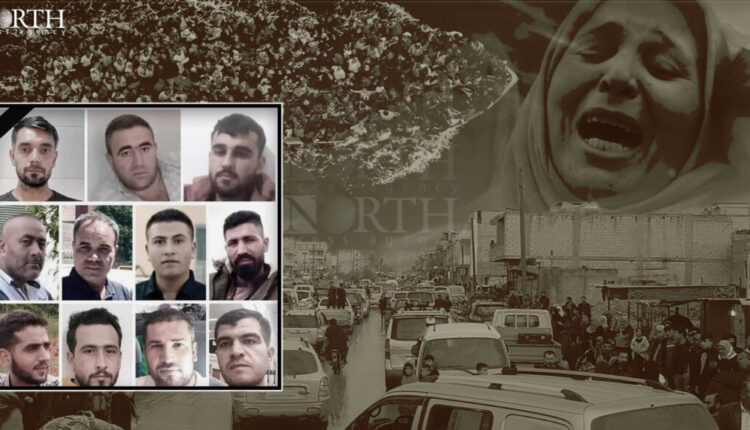Raqqa, Syria (North Press) – The bodies of Syrians who died in a migrant boat which sank off the Algerian coast arrived on Wednesday to their hometown of Kobani, northern Syria, and were buried near their relatives.
On October 5, a boat carrying Syrian migrants, who were heading towards Europe, sank off the coast of Algeria near the port city of Oran, killing at least 18 Syrians, most of whom were from the city of Kobani, northern Syria.
Only one migrant arrived to Spain, while the fate of six people from Kobani is still unknown.
Unfulfilled dreams
Those young men took many things, including their dreams, and decided to immigrate, but the rough sea sent them back home.
The Autonomous Administration of North and East Syria (AANES) formed a committee to retrieve the bodies of the drowned migrants, meeting appeals made by their families.
The AANES was able to return the bodies of eight young men form Kobani, one form Latakia and one form Manbij.
However, the actions of the Algerian authorities delayed the return of the bodies home, especially that they had entered Algerian territory illegally.
Syrians, especially who live in northeastern Syria, have repeatedly immigrated from the country due to the economic crisis and the state of instability which stems from the repeated Turkish threats to invade the region.
Many young men were forced to sell their properties to secure the money needed for such a trip which costs more than $10.000 for each individual, not to mention the risks the migrants may go through.
The victims passed through Lebanon and Libya, then to Algeria, heading towards Europe with the aim to achieve stability and improve their living conditions.
The presence of a large Syrian community in Algeria, especially refugees from Kobani, helped the families of victims to know the fate of their relatives and to identify their bodies.
However, these people could do nothing due to obstacles and strict security measures put by the Algerian government.
After many appeals made by the victims’ families, the AANES formed the committee tasked with retrieving the bodies and took upon itself to incur all expenses.
Muhammad Shahin, Co-chair of the AANES’ Executive Council in Euphrates Region, said, “We opened diplomatic channels and did our best to return the bodies to their families.”
How did the bodies return?
On late October, doctor Muhammad Aref Ali, a member of the AANES-formed committee, said that they were working on returning the bodies home.
Later, the committee did not get the approval of the Lebanese embassy to return the bodies to Beirut airport because the ambassador was busy in attending Arab Summit.
The committee finished all necessary legal measures in the Syrian embassy in Algeria, followed up on procedures in Lebanon’s embassy in Algeria and coordinated with the Lebanese Red Cross to receive the bodies in Lebanon and deliver them to Syria.
On Saturday, Ali said that 10 bodies will arrive on Tuesday to Lebanon, as a plane will take off from Algeria to Qatar and then to Lebanon.
On Tuesday, the Lebanese Red Cross handed over the bodies to the Syrian Red Crescent at the Arida border-crossing in Tartus.
On Wednesday morning, the families of the victims from Kobani rushed to the Furat Hospital in Manbij, waiting for the bodies of their loved ones.
Shahin accompanied the victims’ families to Manbij and thanked the Syrian Red Crescent and the Lebanese Red Cross for their cooperation and contribution in expediting the procedures for transporting the bodies to their hometown.
Two bodies of young men form Kobani are still in Algeria as their transferring procedures have not ended yet.
Fearing return
According to sources of North Press in Algeria, hundreds of Syrians are still trapped in there, willing to return to their cities, but many obstacles, the most notable of which is the illegal entry, impede their return.
On October 20, the Commander in Chief Syrian Democratic Forces (SDF), Mazloum Abdi, called on Syrian, who hail from areas in north and eastern Syria and trapped in Algeria, to return to their homeland, expressing readiness to provide all needed facilitations for their “safe and dignified return.”
Syrians, who are stranded in Algeria, fear the prospect of being handed over to the Syrian government if they returned.
The United Nations High Commissioner for Refugees (UNHCR) said in a report in April, “More than 3,000 people died or went missing while attempting to cross the Central and Western Mediterranean and Atlantic last year to Europe.”
Recently, a video went viral on social media, showing young men, said to be Syrians deported to Niger’s desert by Algeria, suffering grave conditions.
“UNHCR is appealing for support to help provide meaningful alternatives to these dangerous journeys and prevent people from becoming victims of traffickers,” said the UN agency.

